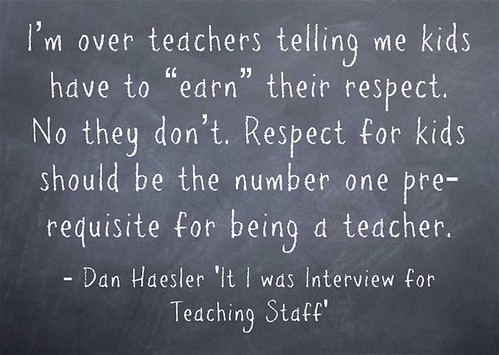
There is so much written about change in education. What is wrong, how things should be fixed. I have added my voice to such dialogue penning a few pieces focusing on innovation and technology. The more that I reflect upon the matter though, the more I feel that an incessant focus on technology often misses the mark. It is the wrong ‘driver’, as Michael Fullan would put it. The real change to me is that of mindset.
In a recent post on George Couros postulated about which attribute was more important when hiring a teacher, “someone who is great with relationships and terrible with technology, over someone who is terrible with relationships but great with technology.” After arguing that relationships trumps technology any day of the week, Couros then went onto suggest that the ability to teach kids how to learn is what is most important at the end of the day. I was left wondering what Couros’ discussion says about education and where it has come in the last few years. It is easy to get caught up in debates about technology when I believe that the greatest change has been a move from a emphasis on power and control in classroom, to a dialogue about culture and environment.
At the start of this year, one of the goals that I set myself was to place students at the centre of the classroom. To step off the stage and let them shine. In reflection I feel that this focus missed something. Instead of ‘students’ at the centre, I now feel that the focus should have been on fostering the optimal conditions for learning. Although students are integral to this process, it is the creation of a positive learning environment, in and out of the classroom, that is central. This starts in my opinion with the teacher and the way they design learning.
Maybe my students have improved, are more behaved than when I started teaching, but I just don’t talk about ‘discipline’ any more. In class or out. My focus instead has moved to learning and creating a classroom where students are able to get the most out of themselves. If there are students who are disengaged, my first port of call is not to chastise them or make veiled threats. My first port of call is me. What are they meant to be doing? Why are they disengaged? Is there anything that I could be doing to support them, either now or maybe next time.
A part of this change of mindsets is being open and honest with students. No secret teachers business, no surprises. I always attempt to share why I chose what I did, whether it be in regards to assessment or curriculum, as well as why I feel that something is not necessarily working the way I intended it to. I may not go to the extent that Cameron Paterson does in sharing research literature with students, but I at least involve them. I do this in the hope that they too can be honest about where they are at and that they feel safe in taking risks with being wrong. For as it is said, you need to be wrong if you are ever going to be right.
We so often give lip service to the saying that students have a right to learn, yet the habits we form in and out of the classroom can seem to counter this. For a right to learn is surely to be spoken to in an appropriate manner, to be given some ownership over learning and to be given a voice about what is and is not necessarily working. The biggest change for me in my time in education has been the introduction of such programs as Restorative Practises, Leading Teams and the Framework for Understanding Poverty. Maybe not necessarily for what they have brought in regards to actions and process, but more so in regards to the way we see things. That are a part of significant shift in paradigm.
For me, without such a change, what are we really aspiring for? For in the end, I believe we are most productive when we have a purpose for learning driven by intrinsic desire, but to have a that learners need to be able to have a say. So let’s start there.
If you enjoy what you read here, feel free to sign up for my monthly newsletter to catch up on all things learning, edtech and storytelling.
Discipline or Learning, What’s Your Mindset? by Aaron Davis is licensed under a Creative Commons Attribution-ShareAlike 4.0 International License.

Aaron, thanks so much for sharing your thoughts on this subject. I get easily distracted by the bells & whistles that are available to educators and students today. Many are wonderful tools that can add to the educational experience, assist with student engagement, and help prepare students for our technology driven future……..but you nailed it in your post. Relationships are the key and developing a classroom where students have voice and choice in their learning. Where student engagement is intentional and something we reflect on, attempt to improve, and don’t blame on the students or their parents. I think I’ll be doing some further reflection on this and possibly a post of my own.
Thanks Tom for your comment. I think that it is a challenging topic. So easy to blame others. However, such a mindset never really gets very far.
This Article was mentioned on collect.readwriterespond.com